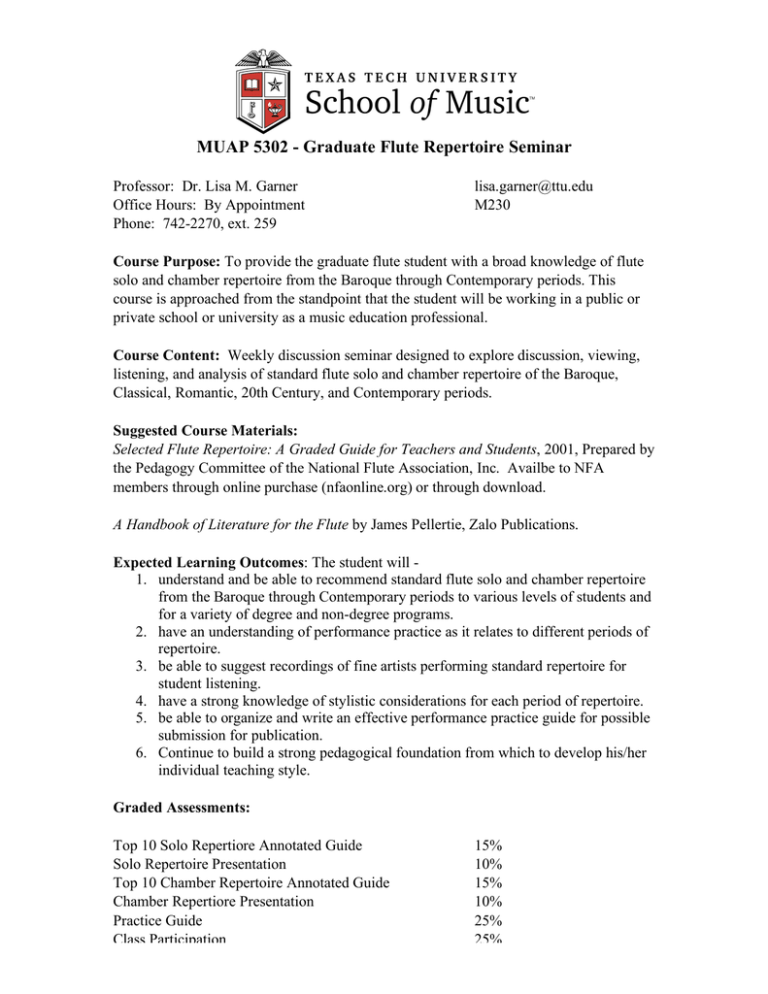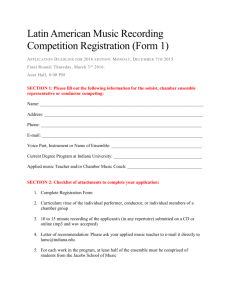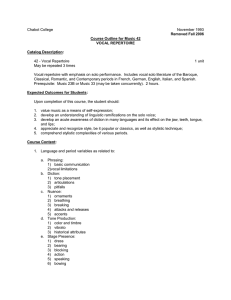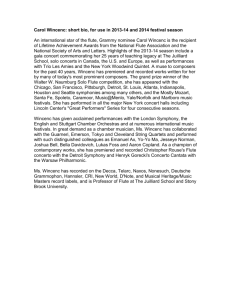MUAP 5302 - Graduate Flute Repertoire Seminar
advertisement

MUAP 5302 - Graduate Flute Repertoire Seminar Professor: Dr. Lisa M. Garner Office Hours: By Appointment Phone: 742-2270, ext. 259 lisa.garner@ttu.edu M230 Course Purpose: To provide the graduate flute student with a broad knowledge of flute solo and chamber repertoire from the Baroque through Contemporary periods. This course is approached from the standpoint that the student will be working in a public or private school or university as a music education professional. Course Content: Weekly discussion seminar designed to explore discussion, viewing, listening, and analysis of standard flute solo and chamber repertoire of the Baroque, Classical, Romantic, 20th Century, and Contemporary periods. Suggested Course Materials: Selected Flute Repertoire: A Graded Guide for Teachers and Students, 2001, Prepared by the Pedagogy Committee of the National Flute Association, Inc. Availbe to NFA members through online purchase (nfaonline.org) or through download. A Handbook of Literature for the Flute by James Pellertie, Zalo Publications. Expected Learning Outcomes: The student will 1. understand and be able to recommend standard flute solo and chamber repertoire from the Baroque through Contemporary periods to various levels of students and for a variety of degree and non-degree programs. 2. have an understanding of performance practice as it relates to different periods of repertoire. 3. be able to suggest recordings of fine artists performing standard repertoire for student listening. 4. have a strong knowledge of stylistic considerations for each period of repertoire. 5. be able to organize and write an effective performance practice guide for possible submission for publication. 6. Continue to build a strong pedagogical foundation from which to develop his/her individual teaching style. Graded Assessments: Top 10 Solo Repertiore Annotated Guide Solo Repertoire Presentation Top 10 Chamber Repertoire Annotated Guide Chamber Repertiore Presentation Practice Guide Class Participation 15% 10% 15% 10% 25% 25% Attendance: Required. Top 10 Solo/Chamber Repertoire Annotated Guides: Compile a list of what you would consider the “Top 10” works from your assigned period of flute repertoire. For the Solo Repertoire Annotated Guide, please inculde at least two unaccompanied works and at least two concerti. Each annotation should include: 1. Opus numbers and/or catalogue numbers and the keys that the work explores. 2. Performance medium (e.g. traverso and continuo, flute and string orchestra, etc.) 3. Publisher and Editor information. If multiple editions are available, include all known editions. 4. Information regarding the level of difficulty of the work in terms of flute technique as well as musical maturity and what those consideration may be (e.g. double tonguing, rhythmic content, extended techniques etc.) as well as stylistic considerations and performanc practice demands (e.g. ornamentation). 5. Formal structure of the work and compositional techniques. 6. Audience accessibility. 7. Bibliography of relevant published articles and/or practice guides. 8. Discography of fine artists performing the work. Class Presentations: Select one work from your prepared annotated guide to present in detail. Prepare 5 copies of the Annotated Guide and as well as copies of the score. Bring at least one high quality recording of the work to played during the class. (If you choose a recording that is only available on cassette or LP, you will need to have it converted to a digital format prior to the class.) Repertoire Practice Guide: Select a work for which a practice guide is not already published. Within the content of the paper, include very brief biographical information about the composer and any interesting circumstances involved in the creation of the work. Provide a basic formal analysis and explore compositional techniques employed. Provide detailed instruction on how to prepare the work for performance. This includes practice techniques, special fingerings, special exercises created specifically for the preparation of the work, etc. Musical examples are required. Include a discography and bibliography. Photos of the composer or performer from the premiere performance or other significant event are encouraged. Special Considerations OP 34.22 ADA STATEMENT: Any student who, because of a disability, may require special arrangements in order to meet the course requirements should contact the instructor as soon as possible to make any necessary arrangements. Students should present appropriate verification from Student Disability Services during the instructor’s office hours. Please note instructors are not allowed to provide classroom accommodations to a student until appropriate verification from Student Disability Services has been provided. For additional information, you may contact the Student Disability Services office at 335 West Hall or 806-742-2405. OP 34.19 ABSENCE DUE TO RELIGIOUS OBSERVANCE: "Religious holy day" means a holy day observed by a religion whose places of worship are exempt from property taxation under Texas Tax Code §11.20. A student who intends to observe a religious holy day should make that intention known in writing to the instructor prior to the absence. A student who is absent from classes for the observance of a religious holy day shall be allowed to take an examination or complete an assignment scheduled for that day within a reasonable time after the absence. Absence due to officially approved trips – The Texas Tech University Catalog states that the person responsible for a student missing class due to a trip should notify the instructors of the departure and return schedule in advance of the trip. The student may not be penalized and is responsible for the material missed. OP 34.12 ACADEMIC INTEGRITY: It is the aim of the faculty of Texas Tech University to foster a spirit of complete honesty and high standard of integrity. The attempt of students to present as their own any work not honestly performed is regarded by the faculty and administration as a most serious offense and renders the offenders liable to serious consequences, possibly suspension. “Scholastic dishonesty” includes, but it not limited to, cheating, plagiarism, collusion, falsifying academic records, misrepresenting facts, and any act designed to give unfair academic advantage to the student (such as, but not limited to, submission of essentially the same written assignment for two courses without the prior permission of the instructor) or the attempt to commit such an act. a. “Cheating” includes, but is not limited to: (1) Copying from another student’s test paper; (2) Using during a test materials not authorized by the person giving the test; (3) Failing to comply with instructions given by the person administering the test; (4) Possession during a test of materials that are not authorized by the person giving the test, such as class notes or specifically designed “crib notes.” The presence of textbooks constitutes a violation only if they have been specifically prohibited by the person administering the test. (5) Using, buying, stealing, transporting, or soliciting in whole or in part the contents of an unadministered test, test key, homework solution, or computer program; (6) Collaborating with or seeking aid or receiving assistance from another student or individual during a test or in conjunction with other assignment without authority; (7) Discussing the contents of an examination with another student who will take the examination; (8) Divulging the contents of an examination for the purpose of preserving questions for use by another when the instructor has designated that the examination is not to be removed from the examination room or not to be returned to or kept by the student; (9) Substituting for another person or permitting another person to substitute for oneself to take a course, a test, or any courserelated assignment; (10) Paying or offering money or other valuable thing to or coercing another person to obtain an unadministered test, test key, homework solution, or computer program, or information about an unadministered test, test key, homework solution, or computer program; (11) Falsifying research data, laboratory reports, and/or other academic work offered for credit; and (12) Taking, keeping, misplacing, or damaging the property of the university or of another if the student knows or reasonably should know that an unfair academic advantage would be gained by such conduct. b. “Plagiarism” includes, but is not limited to, the appropriation of, buying, receiving as a gift, or obtaining by any means material that is attributable in whole or in part to another source, including words, ideas, illustrations, structure, computer code, other expression and media, and presenting that material as one’s own academic work being offered for credit. c. “Collusion” includes, but is not limited to, the unauthorized collaboration with another person in preparing academic assignments offered for credit or collaboration with another person to commit a violation of any section of the rules on scholastic dishonesty. d. “Falsifying academic records” includes, but is not limited to, altering or assisting in the altering of any official record of the university and/or submitting false information or omitting requested information that is required for or related to any academic record of the university. Academic records include, but are not limited to, applications for admission, the awarding of a degree, grade reports, test papers, registration materials, grade change forms, and reporting forms used by the Office of the Registrar. A former student who engages in such conduct is subject to a bar against readmission, revocation of a degree, and withdrawal of a diploma. e. “Misrepresenting facts” to the university or an agent of the university includes, but is not limited to, providing false grades or resumes; providing false or misleading information in an effort to receive a postponement or an extension on a test, quiz, or other assignment for the purpose of obtaining an academic or financial benefit for oneself or another individual; or providing false or misleading information in an effort to injure another student academically or financially. ABSENCE DUE TO OFFICIALLY APPROVED TRIPS: The Texas Tech University Catalog states that the person responsible for a student missing class due to a trip should notify the instructors of the departure and return schedule in advance of the trip. The student may not be penalized and is responsible for the material missed. LAST DAY TO DROP A COURSE: The last day drop a course is the 45th class day of the semester. Civility in the Classroom http://www.depts.ttu.edu/studentaffairs/CampusCrime/documents/CivilityInTheClassroo m.pdf Students are expected to assist in maintaining a classroom environment that is conducive to learning. In order to assure that all students have the opportunity to gain from time spent in class, unless otherwise approved by the instructor, students are prohibited from engaging in any other form of distraction. Inappropriate behavior in the classroom shall result, minimally, in a request to leave class. Student Handbook and Code of Conduct http://www.depts.ttu.edu/studentaffairs/publications/2008_2009_Handbook_and_Code.p df MUAP 5303 Tentative Schedule Week 1 Week 2 Week 3 Week 4 Week 5 Week 6 Week 7 Week 8 Week 9 Week 10 Week 11 Introduction Classical Solo Baroque Solo Romantic Solo 20th Century Solo Baroque Chamber Classical Chamber Romantic Chamber 20th Century Chamber Practice Guide Presentations Practice Guide Presentations Changes may be made to the syllabus at any time.


